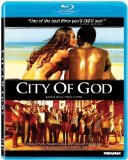| Reviews & Columns |
|
Reviews DVD TV on DVD Blu-ray 4K UHD International DVDs In Theaters Reviews by Studio Video Games Features Collector Series DVDs Easter Egg Database Interviews DVD Talk Radio Feature Articles Columns Anime Talk DVD Savant Horror DVDs The M.O.D. Squad Art House HD Talk Silent DVD
|
DVD Talk Forum |
|
|
| Resources |
|
DVD Price Search Customer Service #'s RCE Info Links |
|
Columns
|
|
|
City of God
Lionsgate Home Entertainment // R // December 13, 2011
List Price: $19.99 [Buy now and save at Amazon]
The Film:
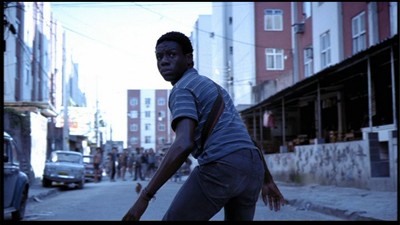 At the beginning of City of God, the streets of Brazil -- the winding slums, not the picturesque landscapes adorning postcards -- come alive through sharpening knives, drum-heavy percussion music, and a pack of children chasing a chicken. Then, the relative normalcy stops: a camera-carrying high-schooler, Rocket, freezes when he comes face-to-face with teenage thugs lugging assault rifles and pistols, while the film's point-of-view rotates around him to show the scope of his dilemma. The viewer doesn't know it yet, but they're about to learn the story of every component in their field of vision, from who the young gangsters are and where they (and Rocket) come from, all the way down to where they obtained their artillery, money, and power, and how the streets of the City of God became their violent playground. Fernando Meirelles' film isn't just a based-on-reality recount of a protagonist; it's a mindful, enthralling examination of how crime metastasizes in a forgotten corner of the world, and how an artist emerges from his harsh surroundings.
At the beginning of City of God, the streets of Brazil -- the winding slums, not the picturesque landscapes adorning postcards -- come alive through sharpening knives, drum-heavy percussion music, and a pack of children chasing a chicken. Then, the relative normalcy stops: a camera-carrying high-schooler, Rocket, freezes when he comes face-to-face with teenage thugs lugging assault rifles and pistols, while the film's point-of-view rotates around him to show the scope of his dilemma. The viewer doesn't know it yet, but they're about to learn the story of every component in their field of vision, from who the young gangsters are and where they (and Rocket) come from, all the way down to where they obtained their artillery, money, and power, and how the streets of the City of God became their violent playground. Fernando Meirelles' film isn't just a based-on-reality recount of a protagonist; it's a mindful, enthralling examination of how crime metastasizes in a forgotten corner of the world, and how an artist emerges from his harsh surroundings.
Nestled in the western boroughs (favelas) of Rio de Janiero, the cidade de deus, or city of god, was established in the '60s to limit the unsightly, condensed shanty towns crowding the outskirts of the country's capital. That's where Rocket's voice-over really begins, after he's caught between a rock and a hard place: bathed in sun-baked orange and sepia tones for added effect, he rewinds to the area's roots during the late-'60s, telling how his brother, Goose, and a piecemeal band of "hoods" indirectly submersed him in the pains and profits of crime, and how the sharing of their spoils with the people of the area paints them in a sympathetic light. After he's painted a clear picture of the town and the hoods' daring but mostly nonviolent activities, including gas-truck heists and pistol-wielding raids on love motels, the story progresses to the '70s, where a grown-up Rocket -- who attends high-school, takes candid photos of his friends, and occasionally smokes weed with a girl he fancies -- navigates the sprawled-out expanses of his home, with power over territories aggressively claimed by those whom grew up around him.
City of God is almost like its own living, breathing organism as it follows Rocket's point-of-view, provoking the senses in just about every way a visual artform can -- both tangibly and evocatively. Director Meirelles uses color, imagery and editing styles to lend unflinching brevity to his film, where particular scenes, like the sharpening of knives at the film's beginning, smartly disorientate the viewer; cutting between shimmering blades grinding against the stone to the worrisome chickens achieves a prophetic mood, giving its audience an idea of what to expect. It's rapidly cut, flashing in variable, beautiful ways, and almost instantly the viewer hones in on this wayward chicken as they desire for it to escape from the volatile world surrounding it. The bird mirrors the attitude that viewers have for Rocket as the film proceeds: as he watches the people around him disappear to the necessities of life in the slums, he feels the desperate immediacy shirk the constraints latching him down to the area.
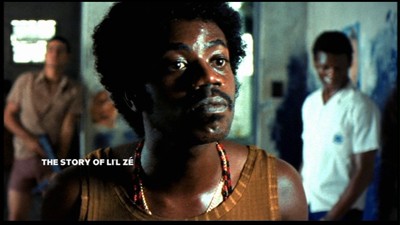 It's no mistake that the shot follows the chased chicken practically into Rocket's arms and into the pathway of Lil' Ze (Dice)'s cohorts. Then, as he comes in contact with this early foreshadow, a beautiful circularly flowing track around Rocket as he becomes surrounded by cops and gang members alike shows the claustrophobia of the situation. Life is a frail and fleeting thing to the city's denizens, an area where police fear to go -- and the bloodthirsty ones are those that hold power. Paramount of those being Lil' Ze, whom we watch grow from a wide-eyed, trigger-happy hooligan into the exact same thing in an adult body, never required to really grow up. City of God makes his menace palpable from the start; his gleeful exaction of crimes of violence transforms his youthful gaze into one that's almost feral, with one of Meirelles' particularly effective visual flourishes showing the progression of his state over the years, and why Rocket's in his right mind to fear the kid he caught glimpses of in his youth.
It's no mistake that the shot follows the chased chicken practically into Rocket's arms and into the pathway of Lil' Ze (Dice)'s cohorts. Then, as he comes in contact with this early foreshadow, a beautiful circularly flowing track around Rocket as he becomes surrounded by cops and gang members alike shows the claustrophobia of the situation. Life is a frail and fleeting thing to the city's denizens, an area where police fear to go -- and the bloodthirsty ones are those that hold power. Paramount of those being Lil' Ze, whom we watch grow from a wide-eyed, trigger-happy hooligan into the exact same thing in an adult body, never required to really grow up. City of God makes his menace palpable from the start; his gleeful exaction of crimes of violence transforms his youthful gaze into one that's almost feral, with one of Meirelles' particularly effective visual flourishes showing the progression of his state over the years, and why Rocket's in his right mind to fear the kid he caught glimpses of in his youth.
Penned by Bráulio Mantovani as an adaptation of Paulo Lins' novel with an emphasis on picaresque chronicles inside the story's full-circle progression, City of God isn't purely about Rocket ... or even predominately about him. Instead, he's our eyes and ears in the impoverished quasi-warzone, observing and growing up around the fester as drug dens change hands, dangerous boys grow into dangerous (or not-so-dangerous) men, and people -- lots of people, of wide-sprawling ages -- die. While the tone sounds intimidating, and of course the overall context of what's going on certainly is, the script's structure sustains a swift, upbeat rhythm that smoothly foreshadows events to come while maintaining an involving curiosity; Rocket introduces crucial, interesting characters, and then insists it's not time to tell their story, yet he'll also pause to recall the history of an apartment, cleverly retelling and re-framing the story several times with different purposes. Even Rocket's cameras, especially the one that'll give him his big break, have a story.
Violent yet elegiac, and stylish while remaining poignant, each graceful storytelling thrust Mereilles offers in City of God notches the point of view closer to what's witnessed at the beginning, painting a contextually and expressively comprehensive portrait of the events and people that shape both Rocket and the tumbledown, intimidating Brazilian crime labyrinth of the '60s and '70s. Watching how the environment drastically influences the status (and, obviously, mortality) of people -- from ritzy playboys and beautiful high-school girls to ex-soldiers and drug addicts -- becomes thoroughly involving in the process, largely navigated by the authenticity of the mostly amateur citizens-turned-actors that bring the slums to life. And once it arrives at the "current" destination from the film's beginning, the fluctuating color schemes and slick transitions of the rich episodic bursts wrapping back to the shot of gangsters trapping Rocket on the bloody streets, we're treated to a fitting, bittersweet catharsis that punctuates the film's gritty aims. It's a great film, and quite a vigorous experience.
The Blu-ray:
Lionsgate shines the high-definition light on City of God by way of Miramax, arriving in a standard-width Blu-ray case with cover artwork very similar to that of the DVD release from several years back. The disc comes with the snapshot of Lil' Ze brandishing a pistol plastered on the top -- a slight, but appreciated touch.
Video and Audio:
César Charlone's photography for City of God wasn't captured with the intention of being crisp, clean, and glitzy; the richness of the image, while often densely detailed and dynamic in terms of depth-of-field and motion, is rooted in its capacity to lend gruffness and gristle to the winding streets, cramped apartments, alleyways and other hotspots in and around the borough. How can a boost in resolution benefit the mostly Super 16mm photography? In refinement, and Lionsgate's Blu-ray arrives up to the task in its 1080p AVC encode, opening its 1.85:1 aspect ratio a bit to fill 16x9 televisions. Close-ups and the sheen against Rocket's dark skin appear much more nimble in comparison to Miramax's DVD, the sepia- and blue-tinted palettes bolstered by a tighter eye for color fluctuations and a capacity to focus on contrast richness. You'll even have a few moments where the radiance of detail will, in fact, leave you impressed, but roughness is key, and the 24p-flow of this image elegantly retains Meirelles' intents.
Man, does the DTS-HD Master Audio track deliver the goods, though, and not just in terms of it being a low-budget, foreign crime film. A few scenes pack a genuine, fierce punch in terms of surround activity and low-end vigor; it's not much of a spoiler to reveal that a shootout occurs in a confined space, where bullets whizz by from all directions, and the clarity of the bullets flying through walls hits hard and fast. Low rumble of cars, the smack of soccer balls on the ground, standard gun fire, and the echoing cackle of laughter from a young boy in a hotel showcase pronounced clarity that only a high-definition track can muster. You'll find moments where the sound design's limitations hold back verbal clarity, but that'll be the end of the gripes as the bustle of the Brazilian streets creates a fine stage. And boy, the rhythmic music sprawls across the stage with a succulent balance that keeps the experience inclusive. Terrific stuff here. English subtitles, which are well-translated and highly legible, appear in crisp white font at the bottom of the image, available in English (both SDH and standard) and Spanish languages.
Special Features:
Somewhat unfortunately, the only special feature we've got here is the Notes from a Personal War (56:38, SD) documentary from Miramax's previous standard-definition presentation, which covers the truth behind the gang activity in Brazil. It's an interesting doc that's a great accompaniment for school classes and first-timers to the film, but I'd like to see some extra material about the construction of the film itself -- behind-the-scenes, impact the film's had on the City of God, something. Meirelles makes for an intelligent commentator, as seen in this interview from Slant Magazine from 2003, and hearing more from him about his namesake achievement would be tremendous.
Final Thoughts:
Raw, uncompromising, yet so polished in its quick-moving, vibrant style that it's enthralling to watch (and revisit), Fernando Meirelles' City of God turns a spotlight on the true story a kid who grew up to become a photographer amidst the violence, drugs, and penniless conditions of one of Brazil's favelas, the cidade de deus, in the '60s and '70s. Everything on display here is top-shelf material, from the grooving score and sharp editing to the performances from people plucked from the area itself, and it comes together into an energetic depiction of juvenile crime that offers heaps of import behind its fury. The Blu-ray presents Meirelles' film in a way that retains the jittery, grainy and surgically harsh composition coursing through its robust veins, and while the lack of new special features disappoints, it's a no-brainer of a High Recommendation at the low price point.
Thomas Spurlin, Staff Reviewer -- DVDTalk Reviews | Personal Blog/Site
 At the beginning of City of God, the streets of Brazil -- the winding slums, not the picturesque landscapes adorning postcards -- come alive through sharpening knives, drum-heavy percussion music, and a pack of children chasing a chicken. Then, the relative normalcy stops: a camera-carrying high-schooler, Rocket, freezes when he comes face-to-face with teenage thugs lugging assault rifles and pistols, while the film's point-of-view rotates around him to show the scope of his dilemma. The viewer doesn't know it yet, but they're about to learn the story of every component in their field of vision, from who the young gangsters are and where they (and Rocket) come from, all the way down to where they obtained their artillery, money, and power, and how the streets of the City of God became their violent playground. Fernando Meirelles' film isn't just a based-on-reality recount of a protagonist; it's a mindful, enthralling examination of how crime metastasizes in a forgotten corner of the world, and how an artist emerges from his harsh surroundings.
At the beginning of City of God, the streets of Brazil -- the winding slums, not the picturesque landscapes adorning postcards -- come alive through sharpening knives, drum-heavy percussion music, and a pack of children chasing a chicken. Then, the relative normalcy stops: a camera-carrying high-schooler, Rocket, freezes when he comes face-to-face with teenage thugs lugging assault rifles and pistols, while the film's point-of-view rotates around him to show the scope of his dilemma. The viewer doesn't know it yet, but they're about to learn the story of every component in their field of vision, from who the young gangsters are and where they (and Rocket) come from, all the way down to where they obtained their artillery, money, and power, and how the streets of the City of God became their violent playground. Fernando Meirelles' film isn't just a based-on-reality recount of a protagonist; it's a mindful, enthralling examination of how crime metastasizes in a forgotten corner of the world, and how an artist emerges from his harsh surroundings. Nestled in the western boroughs (favelas) of Rio de Janiero, the cidade de deus, or city of god, was established in the '60s to limit the unsightly, condensed shanty towns crowding the outskirts of the country's capital. That's where Rocket's voice-over really begins, after he's caught between a rock and a hard place: bathed in sun-baked orange and sepia tones for added effect, he rewinds to the area's roots during the late-'60s, telling how his brother, Goose, and a piecemeal band of "hoods" indirectly submersed him in the pains and profits of crime, and how the sharing of their spoils with the people of the area paints them in a sympathetic light. After he's painted a clear picture of the town and the hoods' daring but mostly nonviolent activities, including gas-truck heists and pistol-wielding raids on love motels, the story progresses to the '70s, where a grown-up Rocket -- who attends high-school, takes candid photos of his friends, and occasionally smokes weed with a girl he fancies -- navigates the sprawled-out expanses of his home, with power over territories aggressively claimed by those whom grew up around him.
City of God is almost like its own living, breathing organism as it follows Rocket's point-of-view, provoking the senses in just about every way a visual artform can -- both tangibly and evocatively. Director Meirelles uses color, imagery and editing styles to lend unflinching brevity to his film, where particular scenes, like the sharpening of knives at the film's beginning, smartly disorientate the viewer; cutting between shimmering blades grinding against the stone to the worrisome chickens achieves a prophetic mood, giving its audience an idea of what to expect. It's rapidly cut, flashing in variable, beautiful ways, and almost instantly the viewer hones in on this wayward chicken as they desire for it to escape from the volatile world surrounding it. The bird mirrors the attitude that viewers have for Rocket as the film proceeds: as he watches the people around him disappear to the necessities of life in the slums, he feels the desperate immediacy shirk the constraints latching him down to the area.
 It's no mistake that the shot follows the chased chicken practically into Rocket's arms and into the pathway of Lil' Ze (Dice)'s cohorts. Then, as he comes in contact with this early foreshadow, a beautiful circularly flowing track around Rocket as he becomes surrounded by cops and gang members alike shows the claustrophobia of the situation. Life is a frail and fleeting thing to the city's denizens, an area where police fear to go -- and the bloodthirsty ones are those that hold power. Paramount of those being Lil' Ze, whom we watch grow from a wide-eyed, trigger-happy hooligan into the exact same thing in an adult body, never required to really grow up. City of God makes his menace palpable from the start; his gleeful exaction of crimes of violence transforms his youthful gaze into one that's almost feral, with one of Meirelles' particularly effective visual flourishes showing the progression of his state over the years, and why Rocket's in his right mind to fear the kid he caught glimpses of in his youth.
It's no mistake that the shot follows the chased chicken practically into Rocket's arms and into the pathway of Lil' Ze (Dice)'s cohorts. Then, as he comes in contact with this early foreshadow, a beautiful circularly flowing track around Rocket as he becomes surrounded by cops and gang members alike shows the claustrophobia of the situation. Life is a frail and fleeting thing to the city's denizens, an area where police fear to go -- and the bloodthirsty ones are those that hold power. Paramount of those being Lil' Ze, whom we watch grow from a wide-eyed, trigger-happy hooligan into the exact same thing in an adult body, never required to really grow up. City of God makes his menace palpable from the start; his gleeful exaction of crimes of violence transforms his youthful gaze into one that's almost feral, with one of Meirelles' particularly effective visual flourishes showing the progression of his state over the years, and why Rocket's in his right mind to fear the kid he caught glimpses of in his youth. Penned by Bráulio Mantovani as an adaptation of Paulo Lins' novel with an emphasis on picaresque chronicles inside the story's full-circle progression, City of God isn't purely about Rocket ... or even predominately about him. Instead, he's our eyes and ears in the impoverished quasi-warzone, observing and growing up around the fester as drug dens change hands, dangerous boys grow into dangerous (or not-so-dangerous) men, and people -- lots of people, of wide-sprawling ages -- die. While the tone sounds intimidating, and of course the overall context of what's going on certainly is, the script's structure sustains a swift, upbeat rhythm that smoothly foreshadows events to come while maintaining an involving curiosity; Rocket introduces crucial, interesting characters, and then insists it's not time to tell their story, yet he'll also pause to recall the history of an apartment, cleverly retelling and re-framing the story several times with different purposes. Even Rocket's cameras, especially the one that'll give him his big break, have a story.
Violent yet elegiac, and stylish while remaining poignant, each graceful storytelling thrust Mereilles offers in City of God notches the point of view closer to what's witnessed at the beginning, painting a contextually and expressively comprehensive portrait of the events and people that shape both Rocket and the tumbledown, intimidating Brazilian crime labyrinth of the '60s and '70s. Watching how the environment drastically influences the status (and, obviously, mortality) of people -- from ritzy playboys and beautiful high-school girls to ex-soldiers and drug addicts -- becomes thoroughly involving in the process, largely navigated by the authenticity of the mostly amateur citizens-turned-actors that bring the slums to life. And once it arrives at the "current" destination from the film's beginning, the fluctuating color schemes and slick transitions of the rich episodic bursts wrapping back to the shot of gangsters trapping Rocket on the bloody streets, we're treated to a fitting, bittersweet catharsis that punctuates the film's gritty aims. It's a great film, and quite a vigorous experience.
The Blu-ray:
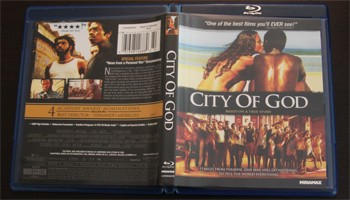 | 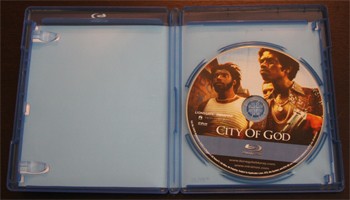 |
Lionsgate shines the high-definition light on City of God by way of Miramax, arriving in a standard-width Blu-ray case with cover artwork very similar to that of the DVD release from several years back. The disc comes with the snapshot of Lil' Ze brandishing a pistol plastered on the top -- a slight, but appreciated touch.
Video and Audio:
César Charlone's photography for City of God wasn't captured with the intention of being crisp, clean, and glitzy; the richness of the image, while often densely detailed and dynamic in terms of depth-of-field and motion, is rooted in its capacity to lend gruffness and gristle to the winding streets, cramped apartments, alleyways and other hotspots in and around the borough. How can a boost in resolution benefit the mostly Super 16mm photography? In refinement, and Lionsgate's Blu-ray arrives up to the task in its 1080p AVC encode, opening its 1.85:1 aspect ratio a bit to fill 16x9 televisions. Close-ups and the sheen against Rocket's dark skin appear much more nimble in comparison to Miramax's DVD, the sepia- and blue-tinted palettes bolstered by a tighter eye for color fluctuations and a capacity to focus on contrast richness. You'll even have a few moments where the radiance of detail will, in fact, leave you impressed, but roughness is key, and the 24p-flow of this image elegantly retains Meirelles' intents.
Man, does the DTS-HD Master Audio track deliver the goods, though, and not just in terms of it being a low-budget, foreign crime film. A few scenes pack a genuine, fierce punch in terms of surround activity and low-end vigor; it's not much of a spoiler to reveal that a shootout occurs in a confined space, where bullets whizz by from all directions, and the clarity of the bullets flying through walls hits hard and fast. Low rumble of cars, the smack of soccer balls on the ground, standard gun fire, and the echoing cackle of laughter from a young boy in a hotel showcase pronounced clarity that only a high-definition track can muster. You'll find moments where the sound design's limitations hold back verbal clarity, but that'll be the end of the gripes as the bustle of the Brazilian streets creates a fine stage. And boy, the rhythmic music sprawls across the stage with a succulent balance that keeps the experience inclusive. Terrific stuff here. English subtitles, which are well-translated and highly legible, appear in crisp white font at the bottom of the image, available in English (both SDH and standard) and Spanish languages.
Special Features:
Somewhat unfortunately, the only special feature we've got here is the Notes from a Personal War (56:38, SD) documentary from Miramax's previous standard-definition presentation, which covers the truth behind the gang activity in Brazil. It's an interesting doc that's a great accompaniment for school classes and first-timers to the film, but I'd like to see some extra material about the construction of the film itself -- behind-the-scenes, impact the film's had on the City of God, something. Meirelles makes for an intelligent commentator, as seen in this interview from Slant Magazine from 2003, and hearing more from him about his namesake achievement would be tremendous.
Final Thoughts:
Raw, uncompromising, yet so polished in its quick-moving, vibrant style that it's enthralling to watch (and revisit), Fernando Meirelles' City of God turns a spotlight on the true story a kid who grew up to become a photographer amidst the violence, drugs, and penniless conditions of one of Brazil's favelas, the cidade de deus, in the '60s and '70s. Everything on display here is top-shelf material, from the grooving score and sharp editing to the performances from people plucked from the area itself, and it comes together into an energetic depiction of juvenile crime that offers heaps of import behind its fury. The Blu-ray presents Meirelles' film in a way that retains the jittery, grainy and surgically harsh composition coursing through its robust veins, and while the lack of new special features disappoints, it's a no-brainer of a High Recommendation at the low price point.
|
| Popular Reviews |
| Sponsored Links |
|
|
| Sponsored Links |
|
|
| Release List | Reviews | Shop | Newsletter | Forum | DVD Giveaways | Blu-Ray | Advertise |
|
Copyright 2024 DVDTalk.com All Rights Reserved. Legal Info, Privacy Policy, Terms of Use,
Manage Preferences,
Your Privacy Choices | |||||||









